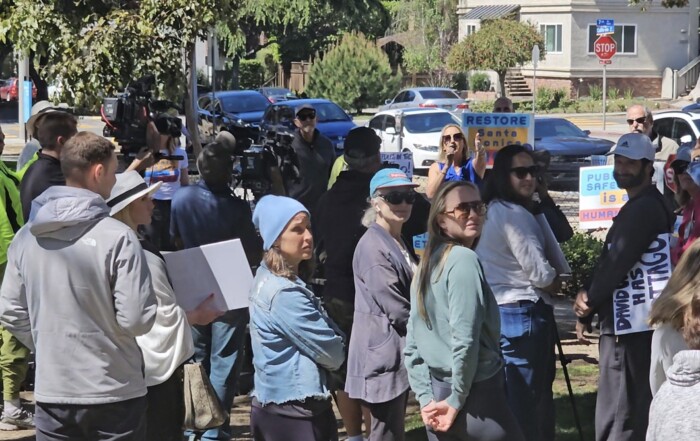On Monday evening, the Culver City Council was asked to consider a proposed ordinance from staff that would establish a $25.00 minimum wage for employees of covered healthcare facilities in the city, most notably the privately owned Southern California Hospital. The genesis for the measure was a proposed local ballot measure that failed to gather enough signatures to qualify for the ballot. According to Assistant City Attorney Lisa Vidra, staff used the initiative language as a basis for their ordinance but with modifications.
Through a number of “Whereas” statements, the proposed ordinance recognizes:
- The special contribution healthcare workers and support staff have played in the COVID crisis and the fact that they are most at risk of transmission
- That retention of workers is becoming difficult due to heavy mental and physical burnout born of long and challenging hours for nearly three straight years. As a result, hospitals are facing staffing shortages statewide that could jeopardize care for Culver City residents
- That cost of living has made it difficult for healthcare workers to stay in greater Los Angeles, and a $25.00 minimum wage would help stabilize incomes as well as compensate healthcare workers for the added risks they take on
The ordinance also takes aim at hospitals as big business, saying, “While healthcare workers are experiencing unprecedentedly difficult working conditions and burnout, the healthcare industry received billions of dollars in stimulus funds during the pandemic and many CEOs were paid compensation packages in the millions. The healthcare industry needs to fairly compensate workers who are sacrificing every day to care for their patients.”
Staff began the discussion by stating they needed to know from the city council whether they would like to endorse the ordinance, how they would plan to enforce it, and what the start date would be.
When the public weighed in, there didn’t appear to be much middle ground. In response to the Service Employees International Union (SEIU) being a major sponsor of the measure, speaker Kelly Estes said she was opposed because “At least two councilmembers accepted donations from SEIU.”
The next speaker, Larry Cregan, countered Estes. “I work at Southern California Hospital,” he began. “Everyone who works in a hospital is around COVID patients. We have 30 employees that now have it, who are sick, and we have 25-30 patients who have COVID who are back in the hospital.” He then spoke of having to work every day for three straight weeks despite being sick before stating, “Twenty-Five dollars?! How can people survive on less than $25 dollars? You people need to have a heart.”
Another healthcare worker, Theresa Scott, agreed with Cregan, saying, “$25.00 dollars is not a lot of money to live off of considering the inflation we’re dealing with right now. My family has taken a hit everywhere we turn.” Later, she added in exasperation, “I really don’t see why $25.00 dollars is such a big thing to not pay out when those hospitals and corporations made billions of dollars off of sick, dying people.”
But speaker Melissa Sanders seemed indignant over the idea that the city would consider a minimum wage for specific workers within a specific industry, something she feels opens up the city to a lawsuit.
Adina Kessler, representing a Hospital Association, was against the measure. “The proposal before you tonight is risky and flawed, and will exclude more healthcare workers than it will benefit.” She added, “It is currently unknown how much it will cost Culver City taxpayers to enforce it.”
Incoming Councilmember Dan O’Brien also rose to oppose the measure, saying, “I want to acknowledge all of our healthcare workers and the difficult jobs they have, and especially what they’ve gone through during COVID.” He then said, “I’m a 17-year union member, my wife is an eight-year union member, and we know the great value that having collective bargaining agreements – a force of people negotiating for you and your salary and benefits – how important that is. I’m really concerned that we’re looking at a specific industry and a specific employee group within that industry to set a floor on the minimum wage.”
Greg Marin, however, disagreed, suggesting that the many speakers who were against the measure but claimed to support healthcare workers were at best inconsistent. He said, “Healthcare workers aren’t looking for a pat on the back, here. They’re looking to put food on the table; They’re looking to put gas in their car; They’re looking to take care of the things they need to in their homes so that they can take care of us as patients.”
Cass Gualvez, a 10-year resident of culver city and SEIU member, says she comes from a family of healthcare workers who has shared with her their stories of burnout and emotional toll. She was concerned about her and her family’s healthcare needs being met, saying, “If one of my rambunctious sons ends up with a broken arm, or if I am short of breath or my sugar gets too low, I want to know that I’m going to an E.R. that’s fully staffed.” She further shared that she knows some healthcare workers who are leaving the industry because “Target is offering $24.00 dollars an hour.”
“I support workers today, tomorrow, and always; so it follows I will support this ordinance,” said Councilwoman Yasmine-Imani McMorrin.” As for enforcement, her understanding is that other jurisdictions that have gone this route have turned to the county for enforcement, and she asked staff to investigate if that is a viable option.
Councilmember Goran Eriksson shared that he is familiar with the stories healthcare workers tell, as he has one in his family. But ultimately, said Eriksson, “On principle for me, this is a labor issue, and should be dealt with between the union and the employer.” He added, “I also think, that Culver City being such a small city in this large metropolitan era, shouldn’t dabble into this issue at all.”
“I think it’s very hard to argue that the minimum wage has destroyed American Industry,” countered outgoing Councilmember Alex Fisch. He then added, “I’ve noticed a trend in consideration of difficult topics in local government. Things that liberals tend to support at the state and national level, but when the question comes home, it’s a little uncomfortable. And it’s a laudatory statement followed by the word, ‘but,’ followed by a negating statement. ‘We support healthcare workers, but;’ ‘We support housing, but’; ‘We support housing first for homeless people, but.’ I think we should just stop before the ‘but,’ and so I will be voting in favor of this tonight.” He also expressed satisfaction with the idea of the county providing enforcement or even hospitals providing self-reporting.
Councilmember Albert Vera questioned how equitable the measure was if it excludes allegedly 82 percent of the city’s healthcare workers, saying it doesn’t go far enough. He said, “I can’t support it or reject it, there’s a lot of work to be done; a lot of unintended consequences coming forward if we push this through right now.” He said he would be abstaining during the vote.
Mayor Daniel Lee cited a Pro Publica study on the company that owns Culver City’s Southern California Hospital that was not complimentary. He says the “in-depth investigation” showed that the hospital, like many across the country, “Is owned by a hedge fund and that hedge fund is owned by another hedge fund.” He then pointed out, “The people who are served by this hospital are primarily Medicare and Medicaid patients, which means they are mostly Black and Brown and low-income. Most people who live in Culver City do not use this hospital, so when people talk about equity and equity of service, they’re being either intentionally disingenuous or they are lying.”
He then offered to expand the measure, saying, “If my colleagues are open, I would be 100 percent happy to include, in addition to Southern California Hospital, community clinics, urgent care clinics, public hospital facilities, dental offices, and any other facilities that you’d like where medical professional have to interact with people who might have COVID.”
Ultimately the original motion was passed 3-1-1 with Eriksson opposed and Vera abstaining. It did not include the additional healthcare workers outlined by Mayor Lee. Consensus centered around a 90-day implementation period with a belief the County of Los Angeles should cover enforcement.
The photo will receive another reading and require final passage next week.
Photo from the Southern California Hospital Website
Stay informed. Sign up for The Westside Voice Newsletter
By clicking submit, you agree to share your email address with Westside Voice. We do not sell or share your information with anyone.








